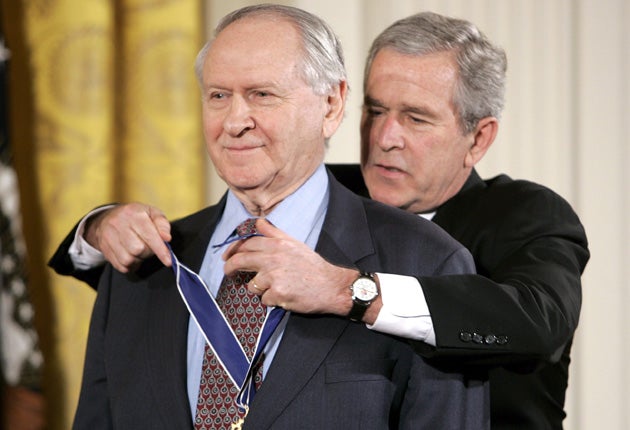William Safire: Waspish journalist and Nixon speechwriter later celebrated for his 'On Language' column

Your support helps us to tell the story
From reproductive rights to climate change to Big Tech, The Independent is on the ground when the story is developing. Whether it's investigating the financials of Elon Musk's pro-Trump PAC or producing our latest documentary, 'The A Word', which shines a light on the American women fighting for reproductive rights, we know how important it is to parse out the facts from the messaging.
At such a critical moment in US history, we need reporters on the ground. Your donation allows us to keep sending journalists to speak to both sides of the story.
The Independent is trusted by Americans across the entire political spectrum. And unlike many other quality news outlets, we choose not to lock Americans out of our reporting and analysis with paywalls. We believe quality journalism should be available to everyone, paid for by those who can afford it.
Your support makes all the difference.It was one of the more remarkable transitions in the history of American communications – from barbed speechwriter for a reviled, soon-to-be-disgraced Republican president to columnist who adorned the editorial pages of the pre-eminent liberal newspaper in the land for more than 30 years. But William Safire was never easy to categorise.
His own political views he described as "libertarian conservative," and Safire gave weekly proof of them in his long tenure as a columnist for the New York Times. But whether inveighing against Democrats or Republicans, the former loyalist of Richard Nixon pulled no punches.
Above all, he was a keen student of the words he wielded with such effect. In his later years Safire was at least as well known for the delightful "On Language" column he wrote in the Times' Sunday magazine, from 1979 until the very month of his death. There the often waspish op-ed writer mutated into a witty and pedantic contrarian, with a rapier eye that spotted new usages (and abuses) almost before they were uttered or written.
Communication, in one form or other, was in Safire's blood. He dropped out of university before he was 20 to take a job as an assistant for a columnist on the now defunct New York Herald Tribune. He worked as a TV correspondent and served in the army before going into public relations, where his path would fatefully – and sensationally – cross with that of the future president.
In 1959 Safire found himself in Moscow, promoting an exhibition on "the typical American house," to be opened by Nixon, then Eisenhower's vice-President. Somehow he managed to get both Nixon and Nikita Khrushchev, the Soviet leader, into the kitchen showroom, where they engaged in the celebrated "kitchen debate" on the relative merits of communism and capitalism.
At one point an American press photographer, blocked by guards threw his camera to Safire, who obliged by taking the subsequently famous shot of the two leaders arguing. The picture helped cement Nixon's credentials as a Cold War warrior. No less important, it earned Safire an enduring warm spot in his heart.
After working on the 1968 campaign (in which he wrote Nixon's victory speech) Safire took up full-time residence in the White House, as part of a formidable speechwriting team that included Pat Buchanan, the future Republican presidential contender, and the presidential scholar and commentator David Gergen. No one, however, could coin phrases quite like Safire, as he put words in the mouths of Nixon, and later his vice-president Spiro Agnew, on topics ranging from the economy to Vietnam.
Alliteration was his special talent, as evidenced in the line for which Safire the speechwriter is best remembered: the "nattering nabobs of negativism," used by Agnew to attack critics of the war, but which soon turned into a portmanteau denunciation of the media in general. As Safire wryly noted years later, "it was either the nabobs or 'the hopeless, hysterical hypochondriacs of history.' And he [Agnew] went with the better one."
Fortunately Safire left the White House for the Times in 1973 before the Watergate scandal reached boiling point. Even so, the switch caused deep unease among old and new colleagues alike. In the bunker of the Nixon White House, they wondered whether he would sell out to the liberal left-wing establishment. At the sober and tradition-bound Times, staffers were no less suspicious of this conservative cross-over whom one commentator likened to "a gaudy flame on display in a grey museum."
In the event, everyone would benefit. The newspaper gained a provocative, highly amusing and exceedingly well informed columnist, while conservatives could feel their voice had not fallen silent, whatever the disasters befalling the Republican party. "Here he was... smack dab in the middle of this very liberal newspaper, and giving no quarter nor asking for any," the former Nixon speechwriter Ben Stein told National Public Radio years afterwards. "And this was a great beacon to us in the years of darkness."
But Safire was not yet done. He found time to write four novels as well as a 1975 memoir of his White House years, Before the Fall. For connoisseurs of US politics, however, perhaps best of all is Safire's Political Dictionary, first published in 1968 and last updated in 2008. It is wise, funny, and endlessly fascinating, a lexicological jewel that in its way is a small history of America.
Rupert Cornwell
William Safire, journalist and author: born New York City December 17 1929; Special Assistant to President Nixon, 1969-1973; columnist, New York Times, 1973-2005; married 1962 Helene Julius (one son, one daughter); died Rockville, Maryland 27 September 2009.
Join our commenting forum
Join thought-provoking conversations, follow other Independent readers and see their replies
Comments